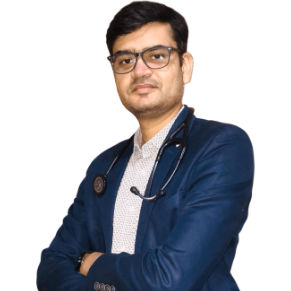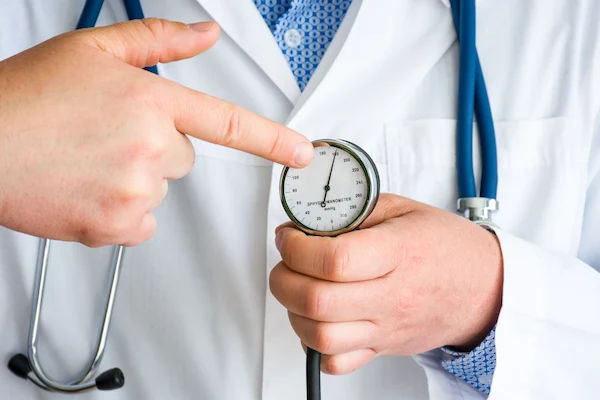Guide to Hypertension The 'silent Killer'
Learn what hypertension is, why it’s called the silent killer, and how to manage it with lifestyle changes, monitoring, and treatment. Explore causes, risks, and prevention strategies.

Written by Dr. M L Ezhilarasan
Reviewed by Dr. Shaik Abdul Kalam MD (Physician)
Last updated on 13th Jan, 2026

Introduction
You feel perfectly fine. You’re going about your day with energy and without a single ache or pain. Yet, beneath the surface, a silent, relentless force could be damaging your arteries, heart, brain, and kidneys. This is the insidious nature of hypertension, commonly known as high blood pressure, which has earned its ominous nickname: the silent killer.
Often presenting no obvious symptoms until significant damage is done, hypertension is a leading risk factor for heart disease and stroke worldwide. But knowledge is power. This comprehensive guide will demystify hypertension, explaining what it is, why it’s so dangerous, and, most importantly, how you can take control of your numbers and protect your long-term health through effective management and prevention strategies.
What is Hypertension? The Basics of Blood Pressure
Before we can understand the problem, we need to understand the mechanism. Blood pressure is the force exerted by circulating blood against the walls of the body’s arteries, the major blood vessels. Think of your circulatory system as a sophisticated garden hose network. The heart is the pump, and the arteries are the hoses. Hypertension occurs when the force of the blood pushing against the hose walls is consistently too high. This puts extra strain on both the pump (your heart) and the hoses (your arteries), causing them to wear out faster than they should.
Over time, this increased pressure can damage artery walls, making them stiff, narrow, or weak. This damage can lead to clots forming or the weakened arteries can bulge, forming an aneurysm. Furthermore, your heart must work much harder to pump blood against this high pressure, which can lead to the heart muscle thickening and eventually failing—a condition known as heart failure.
A. Systolic vs. Diastolic: What Do the Numbers Mean?
When you get a blood pressure reading, it comes as two numbers, written one over the other (e.g., 120/80 mmHg).
- Systolic Pressure (the top number): This measures the pressure in your arteries when your heart beats and pumps blood out.
- Diastolic Pressure (the bottom number): This measures the pressure in your arteries when your heart is at rest between beats.
Both numbers are important, but for adults over 50, systolic pressure is often considered a more significant risk factor for cardiovascular disease.
B. The Blood Pressure Chart: From Normal to Hypertensive Crisis
To understand whether your numbers fall within a healthy or dangerous range, it helps to know the widely accepted categories. According to the American Heart Association (AHA):
- Normal: Less than 120/80 mm Hg
- Elevated: Systolic between 120-129 and diastolic less than 80
- Hypertension Stage 1: Systolic between 130-139 or diastolic between 80-89
- Hypertension Stage 2: Systolic at least 140 or diastolic at least 90
- Hypertensive Crisis: Systolic over 180 and/or diastolic over 120 (requires immediate medical attention)
Consult Top Doctors for Your Symptoms
Why Is It Called the Silent Killer? The Absence of Warning Signs
The most dangerous aspect of hypertension is its stealth. Most people with high blood pressure will experience no
symptoms at all, even if their readings reach dangerously high levels. This lack of obvious warning signs is precisely why it's dubbed the silent killer. People can live with the condition for years without knowing, all the while sustaining damage to their vital organs. This is why regular screening is non-negotiable. You cannot rely on feeling unwell to know if your blood pressure is high.
When Symptoms Do Appear: Recognising Hypertensive Emergencies
When blood pressure reaches a severely high level (a Hypertensive Crisis), symptoms may finally manifest. These are medical emergencies, and you should seek immediate care. Symptoms can include:
- Severe headaches
- Nosebleeds
- Severe anxiety
- Shortness of breath
- Chest pain
- Visual changes
If you experience any of these alongside a high reading, consult a doctor online with Apollo24|7 for immediate triage or go to the nearest emergency room.
Root Causes and Major Risk Factors
For most adults, there's no single identifiable cause of high blood pressure. This type, called primary (essential)
hypertension, tends to develop gradually over many years. Secondary hypertension is caused by an underlying
condition and tends to appear suddenly.
A. Non-Modifiable Risks (Age, Genetics, Race)
Some risk factors are beyond your control:
- Age: Risk increases as you get older as arteries become stiffer.
- Family History: Hypertension tends to run in families.
- Race: It is more common and often more severe in people of African heritage.
B. Modifiable Risks: The Factors You Can Control
Unlike the fixed risks, these are areas where lifestyle changes can make a significant impact:
- Diet High in Sodium (Salt): Excess sodium causes your body to retain fluid, increasing blood pressure.
- Lack of Physical Activity: A sedentary lifestyle leads to higher heart rates and weight gain.
- Obesity or Being Overweight: Extra weight increases the amount of blood required to supply oxygen and nutrients, which raises pressure.
- Tobacco Use and Vaping: Chemicals in tobacco can damage artery linings and cause narrowing.
- Chronic Stress: While not a direct cause, stress can lead to temporary spikes and unhealthy coping habits.
- Excessive Alcohol Consumption further contributes to high blood pressure.
The Domino Effect: Serious Health Complications of Uncontrolled Hypertension
The constant excessive force of blood rushing through your arteries wreaks havoc on your entire system. Uncontrolled high blood pressure is a primary driver of catastrophic health events.
1. Heart Attack, Stroke, and Aneurysm
Damaged arteries can become blocked, preventing blood flow to the heart (heart attack) or brain (ischaemic stroke). Weakened arteries can also burst, causing a haemorrhagic stroke. High pressure may also cause a section of an artery wall to weaken and bulge, forming an aneurysm, which can be life-threatening if it ruptures.
2. Kidney Disease (Hypertensive Nephropathy)
Your kidneys are filters that rely on healthy blood vessels. Hypertension can damage both the arteries leading to the kidneys and the tiny filtering units within them, leading to kidney failure and requiring dialysis.
3. Vision Loss and Eye Damage
High blood pressure can strain and damage the delicate, tiny blood vessels that supply blood to your eyes, leading to retinopathy. This can result in bleeding, blurred vision, and complete loss of sight.
How is Hypertension Diagnosed and Monitored?
Diagnosis is simple and painless: a blood pressure test using an inflatable cuff. Because blood pressure fluctuates
throughout the day, a diagnosis of hypertension is usually not based on a single reading. Your doctor will likely take several readings over multiple visits.
A. In-Clinic vs. Home Blood Pressure Monitoring
Some people experience "white coat hypertension," where their blood pressure is high in a clinical setting but normal elsewhere. To get a true picture, your doctor may recommend home blood pressure monitoring. This involves taking your own readings at different times of day and logging them. Apollo24|7 offers convenient home collection services for tests like lipid profiles and HbA1c that are crucial for a complete cardiovascular risk assessment alongside blood pressure monitoring.
B. Understanding Ambulatory Blood Pressure Monitoring (ABPM)
In some cases, a doctor may prescribe a 24-hour ABPM. This is a small, portable device that automatically takes your blood pressure at regular intervals over 24 hours, providing the most accurate picture of your daily fluctuations.
First-Line Defence: Effective Lifestyle Changes to Lower BP
Lifestyle modification is the cornerstone of hypertension management and prevention. For some with elevated blood pressure, these changes alone can bring numbers back into a healthy range.
1. The DASH Diet: Your Blueprint for Heart-Healthy Eating
The Dietary Approaches to Stop Hypertension (DASH) eating plan is consistently ranked as one of the best diets for heart health. It emphasises:
- Eating vegetables, fruits, and whole grains
- Including fat-free or low-fat dairy products, fish, poultry, beans, and nuts
- Limiting foods high in saturated fat (red meat, full-fat dairy) and sugar-sweetened beverages
2. The Role of Sodium and Potassium
Reducing sodium intake is arguably the most critical dietary change. Aim for less than 2,300 mg a day, with an ideal limit of 1,500 mg for most adults. At the same time, increase your intake of potassium-rich foods (e.g., bananas, spinach, sweet potatoes), as potassium lessens the effects of sodium.
3. Exercise Prescription for Hypertension Management
Regular physical activity, at least 150 minutes of moderate-intensity exercise (like brisk walking) or 75 minutes of
vigorous exercise (like running) per week, can lower your blood pressure by 5 to 8 mm Hg. Consistency is key.
Medications for Hypertension: When Lifestyle Isn't Enough
If lifestyle changes aren't sufficient, several classes of effective medications can help. It's common to need two or more drugs to achieve control.
Common classes of blood pressure drugs include
- Diuretics (Water Pills): Help kidneys remove sodium and water, reducing blood volume.
- ACE Inhibitors: Help relax blood vessels by blocking the formation of a natural chemical that narrows them.
- Angiotensin II Receptor Blockers (ARBs): Help relax blood vessels by blocking the action of that same chemical.
- Calcium Channel Blockers: Help relax the muscles of your blood vessels.
The right medication depends on your readings, other health conditions, and potential side effects. It's crucial to take them as prescribed, even if you feel fine.
Can Hypertension Be Prevented? Proactive Steps for a Healthy Heart
Prevention and treatment often overlap. The same healthy lifestyle changes used to treat high blood pressure can also prevent it from developing in the first place. Adopting a heart-healthy diet, maintaining a healthy weight, staying physically active, managing stress, limiting alcohol, and not smoking are your best defences. Regular check-ups to know your numbers are the final, critical piece of the prevention puzzle.
Conclusion
Hypertension, the silent killer, is a pervasive and serious condition, but it is far from an inevitable fate. Its power lies in its secrecy, but we can disarm it through awareness and action. By understanding the risks, knowing your numbers through regular monitoring, and embracing proven lifestyle changes like the DASH diet and regular exercise, you can take firm control of your heart health. If medications are needed, they are powerful tools to help you stay in control. Managing your blood pressure is a lifelong commitment to protecting your heart, brain, and kidneys for years to come. If you haven't had your blood pressure checked in the last year, make an appointment with your doctor or use a reliable monitor at home today.
Consult Top Doctors for Your Symptoms
Consult Top Doctors for Your Symptoms
Dr. Praveen Jaiswal
Cardiologist
17 Years • MD(Medicine), DM(Cardiology)
Indore
Apollo Hospitals Vijay Nagar, Indore

Dr. Bhethala Sharan Prakash
General Physician/ Internal Medicine Specialist
5 Years • MBBS MD
Bengaluru
PRESTIGE SHANTHINIKETAN - SOCIETY CLINIC, Bengaluru

Dr. Sushith C
General Physician
2 Years • MBBS
Bengaluru
PRESTIGE SHANTHINIKETAN - SOCIETY CLINIC, Bengaluru

Dr. Abhishek Rathore
Cardiologist and Electrophysiologist
7 Years • MBBS, MD (Gen. Medicine), DM ( Cardiology ), Post-Doctoral Fellowship in Cardiac Electrophysiology.
Indore
Apollo Hospitals Vijay Nagar, Indore

Dr. Sarita Rao
Cardiologist
17 Years • MBBS, DM (Cardiology)
Indore
Apollo Hospitals Vijay Nagar, Indore
Consult Top Doctors for Your Symptoms
Dr. Praveen Jaiswal
Cardiologist
17 Years • MD(Medicine), DM(Cardiology)
Indore
Apollo Hospitals Vijay Nagar, Indore

Dr. Bhethala Sharan Prakash
General Physician/ Internal Medicine Specialist
5 Years • MBBS MD
Bengaluru
PRESTIGE SHANTHINIKETAN - SOCIETY CLINIC, Bengaluru

Dr. Sushith C
General Physician
2 Years • MBBS
Bengaluru
PRESTIGE SHANTHINIKETAN - SOCIETY CLINIC, Bengaluru

Dr. Abhishek Rathore
Cardiologist and Electrophysiologist
7 Years • MBBS, MD (Gen. Medicine), DM ( Cardiology ), Post-Doctoral Fellowship in Cardiac Electrophysiology.
Indore
Apollo Hospitals Vijay Nagar, Indore

Dr. Sarita Rao
Cardiologist
17 Years • MBBS, DM (Cardiology)
Indore
Apollo Hospitals Vijay Nagar, Indore
More articles from High Blood Pressure
Frequently Asked Questions
Q1. Can I have high blood pressure if I feel fine?
Yes. This is why it’s called the silent killer. Most people with hypertension have no symptoms, which is why regular screening is so critical, even if you feel healthy.
Q2. What is considered a dangerously high blood pressure reading?
A reading above 180/120 mm Hg is a hypertensive crisis. If you get this reading and are also experiencing chest pain, shortness of breath, or back pain, seek emergency medical care immediately.
Q3. How can I lower my blood pressure naturally?
Key natural strategies include adopting the DASH diet, significantly reducing your sodium intake, engaging in regular aerobic exercise, maintaining a healthy weight, limiting alcohol, and managing stress through techniques like meditation.
Q4. Does caffeine cause high blood pressure?
Caffeine can cause a short, sharp spike in blood pressure, even in people without hypertension. The long-term effects on blood pressure are less clear, but moderating intake is generally advised.
Q5. How often should I check my blood pressure at home?
If your doctor has asked you to monitor at home, they will give you a specific plan. A common recommendation is to take it twice in the morning before medication and twice in the evening, for several days a week, and to log all readings to share with your doctor.




